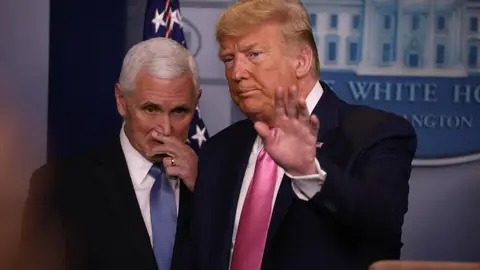Trump Picks Pence, Who Made an HIV Epidemic Worse, to Lead Coronavirus Response

President Donald Trump has tapped Vice President Mike Pence to lead federal efforts against the spread of the coronavirus.
The Centers for Disease Control (CDC) said on Wednesday—the same day as the briefing—that the U.S. might have its first case of community transmission, an individual having tested positive in California despite not having traveled to any country with a known outbreak and not having come in contact with anyone known to be infected.
"Mike is going to be in charge, and Mike will report back to me," Trump said at the briefing. "But he’s got a certain talent for this."
But those familiar with his handling of a health crisis in Indiana are less sure of his ability to respond to this global threat.
In late 2014 and into 2015, Indiana was facing a serious HIV epidemic, resulting from intravenous drug use. Small, rural Scott County saw 215 people test positive, in an area of fewer than 24,000 people. It was a massive increase for a county used to seeing no new infections reported most years.
Needles were illegal to possess in Indiana without a prescription, and then-Governor Pence was opposed to needle exchange programs on moral grounds, believing they would result in increased drug abuse. It took pressure from the local community, as well as advice from the local sheriff to finally force him into action, some two months after the outbreak was detected. But even then, the needle exchange program he initially agreed to was only for 30 days and was limited to Scott County.
"They had to twist his arm to get the one in Scott County,” Carrie Ann Lawrence, of Indiana University’s Rural Center for AIDS/STD Prevention, told Politico. “The [CDC] pretty much said you need to do this.”
Eventually, he was convinced to extend the moratorium on needle exchange programs statewide, although even then counties experiencing increasing HIV or hepatitis C infection rates had to declare a public health emergency, apply for state approval, and then hope to be allowed to set up needle exchange programs for up to one year.
In addition to concerns over placing Pence in charge of the response to coronavirus, critics have noted the Trump administration's actions have made fighting this, and any, epidemic more difficult.
The administration disbanded two groups formed during the Obama administration to respond to pandemics, in the White House National Security Council and the Department of Homeland Security. It also downsized its efforts globally to fight infectious-disease epidemics in 39 out of 49 countries.
A bipartisan group of lawmakers and health experts convened by the think tank Center for Strategic and International Studies released a report in November, with the number one suggestion being to reinstate the pandemic response groups.
“Critical leadership gaps remain,” it warns. “It remains unclear who would be in charge at the White House in the case of a grave pandemic threat or cross-border biological crisis, whether natural, accidental, or deliberate.”
The full White House press briefing on the coronavirus response follows.





